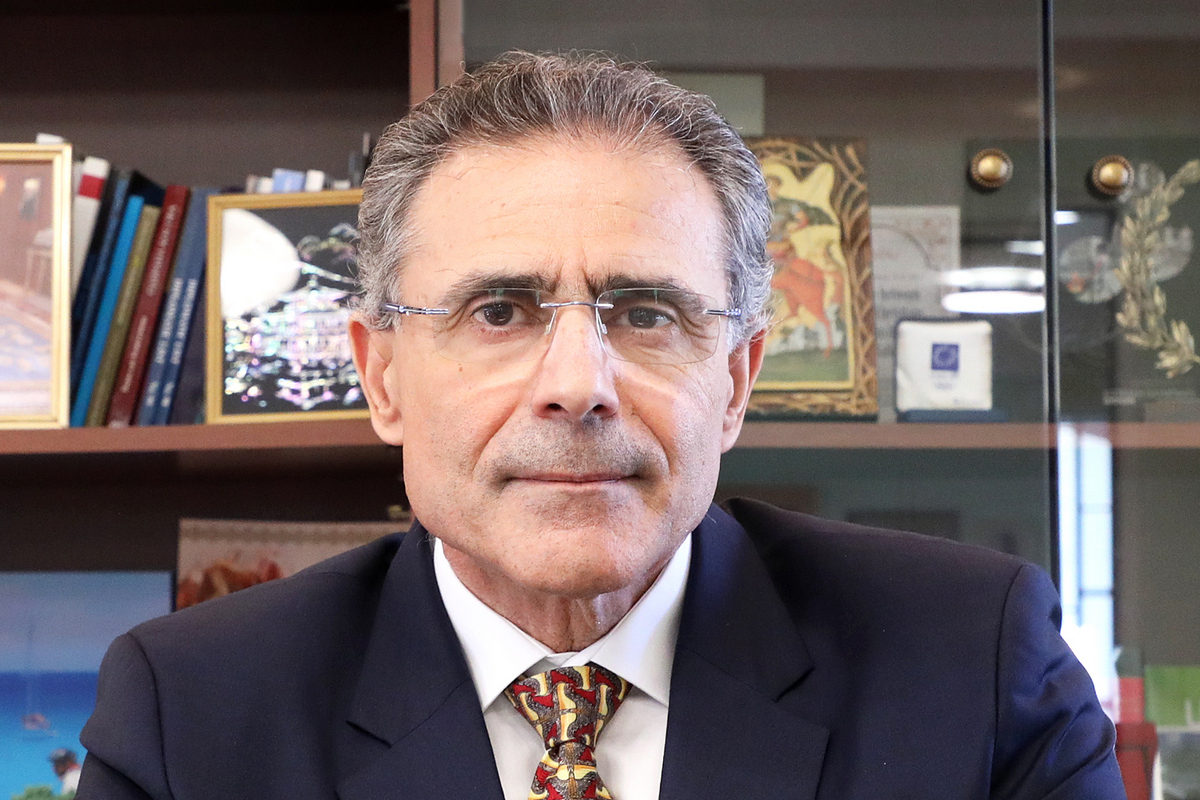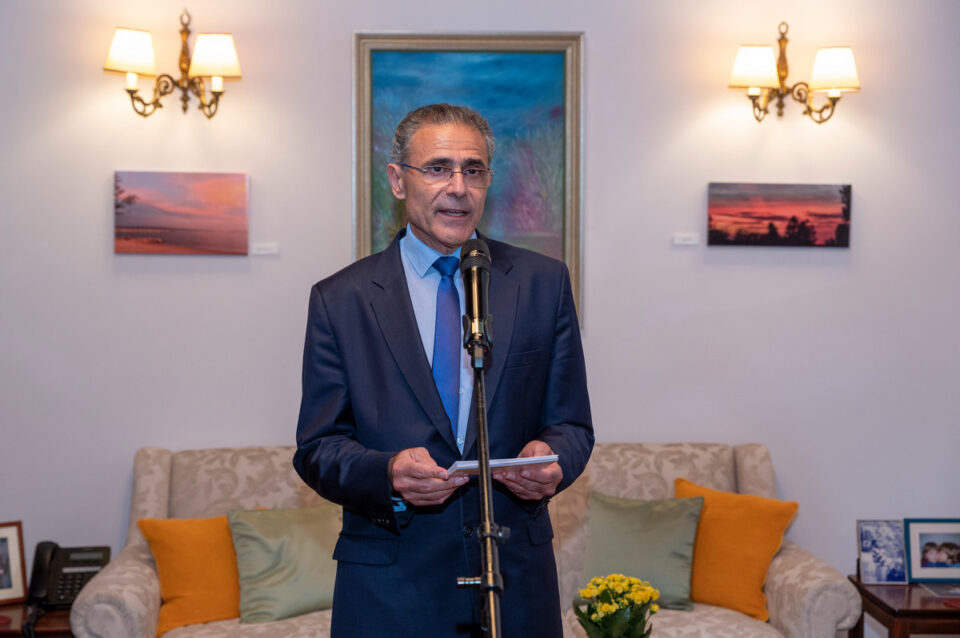Without Serbia, we essentially lose the Balkans

In an enlightening conversation, we take a retrospective journey into the eventful two-and-a-half-year diplomatic mission of the outgoing Ambassador of Cyprus, Demetrios Theophylactou, to Serbia, marking a period filled with challenges, achievements, and a deep immersion into Serbian culture and society.
You spent a little more than two years in Serbia. Considering your rich diplomatic experience, how challenging was your position in Belgrade?
My mission in Serbia was exactly two-and-a-half years, which is rather short but rich in terms of both diplomatic and social experiences. Diplomatically, it was a challenge in so far as balancing the promotion of traditionally strong ties between Serbia and Cyprus, on the one hand, and on the other, the collective EU effort to assist Serbia in order to advance the reform process, with a view to accelerating its EU accession. I believe that I was able to achieve both objectives, though clearly, these are ongoing and rather difficult processes. Notwithstanding, my diplomatic tenure in Serbia was a pleasant experience, as I was able to learn more deeply about the culture and society itself, understand the mindset of the Serbian people better, and interact with them in various ways, from cultural events to sports and other creative activities. Getting familiar with this society was easier for me than, perhaps, other colleagues, if only because we are quite similar in our mentality and way of thinking. I often said that Serbs are as emotional, passionate, friendly, and hospitable as Cypriots. All in all, the time I spent in Serbia was inspirational and quite active, but essentially very pleasant.
How does Cyprus view the Serbian role in the Balkan region, and what steps could be taken to promote stability and cooperation in the area further?
We believe that Serbia has a special role to play in terms of ensuring both regional stability and economic growth in the Western Balkans. It is clear to everyone, particularly within the EU, that despite the challenges that Serbia and other regional candidate states face, without Serbia, we essentially lose the Balkans. Therefore, certain decisive steps are necessary to ensure that Serbia receives all possible support to accelerate its own economic growth, the reform process, including in respect of the rule of law, to upgrade its infrastructure, and further engage in trade and economic exchanges with neighbors. In this regard, the Open Balkan initiative, which Serbia embraced from the very beginning, can decisively accelerate the process of regional cooperation and have a positive impact on peace and regional stability. The EU can play a central role in this process, and certainly, it should provide more concrete support in the acceleration of the EU accession of Western Balkan states.
How has Cyprus’ experience with EU membership impacted its relationship with Serbia, particularly in the context of Serbia’s ongoing efforts to join the European Union?
In my 30 years of diplomatic activity, which covered four continents, I often had to deal with the Balkans – whether at the United Nations in the early 1990s or in the European Union from 2004 up until 2010. Therefore, I was familiar with issues like Kosovo and challenges concerning historical grievances and legacies in Western Balkan states.
My diplomatic tenure in Serbia was a pleasant experience
At the same time, I was able to discuss, in the context of EU Ambassadors’ meetings, the European perspective of Serbia and the Balkan countries that are candidates for EU membership. As an EU Member State, Cyprus has shared its own experience, after nearly twenty years of membership, by providing, for example, technical expertise in sectors where we have a comparative advantage. We are open to readily extending and expanding our technical assistance to provide valuable insight and support in the accession process, in addition to our strong political support. Cyprus has been a strong advocate within the EU for Serbia’s integration into the EU, inter alia, by encouraging Belgrade to implement all necessary reforms. Cyprus has also strongly encouraged Serbia to remain committed to the European agenda and has emphasized the benefits of EU membership, such as economic growth, social progress, political stability, and regional cooperation. Overall, Cyprus’ experience within the EU has strengthened the traditionally excellent relations with Serbia, highlighting the importance of cooperation and mutual respect in the context of the EU integration process.

What were the significant achievements in the relationship between Cyprus and Serbia regarding trade, investment, and cultural exchange during your appointment here? What initiatives should be continued?
Like every Ambassador, I set a few priorities in December 2020, when I assumed my duties. One was to increase trade and economic cooperation, enhance collaboration in science and technology, with emphasis on IT applications in sectors such as energy efficiency, and significantly raise the number of visitors to and from Cyprus. In my view, a significant achievement was setting up a collaboration framework between our top universities and research institutes, including the Biosens Institute at the University of Novi Sad. I had the pleasure to give lectures on energy strategy, for instance, and meet the Rectors of major universities and Deans of key Faculties, like Mathematics and Information Technologies, Electrical and Civil Engineering, and Physics.
The initiatives that should be continued include collaboration in areas such as energy, infrastructure, and tourism. Moreover, we can provide further opportunities to scientists for closer cooperation and synergies in various fields, with a strong emphasis on scientific research in renewable energy.
Can you provide an update on the current state of Cyprus’ reunification efforts and discuss any potential implications of a resolution for Cyprus-Serbia relations?
After taking office just recently, and based on his pre-election programme, President Nikos Christodoulides pursued a new initiative, namely that the European Union must assume a more active role with respect to a new round of negotiations, which we hope will start soon. Regretfully, the policy and public rhetoric of Ankara have not been conducive to a viable settlement. Turkey aims to impose the permanent division of Cyprus through a “two-state” solution. This is in absolute contravention of the agreed basis for a settlement, that is, a bizonal bicommunal federation, as provided for by relevant UN Security Council Resolutions. Yet the solution is a high priority for the new Government, simply because we must give peace another chance. We are ready to resume negotiations in good faith and in compliance with relevant United Nations Resolutions. Yet, by no means are we ready to deviate from key principles of international law in order to have a solution, especially one that is neither viable nor guarantees the future functioning of the state. The solution must primarily comply with the EU Acquis Communautaire, the EU Constitutional and Legal Framework. As a Member of the European Union, we should expect nothing less.
I had the pleasure of giving lectures on energy strategy
Now, as for potential implications of a Cyprus settlement for Cyprus – Serbia relations, we believe that a solution, if premised on the EU Acquis and international law, respecting the fundamental principles of sovereignty and territorial integrity, and guaranteeing the three fundamental freedoms for all citizens, that is, freedom of settlement, property, and movement, it would have a positive impact on our relations with Serbia. Clearly, Cyprus has been fully supportive of Serbia’s European perspective, as well as of EU efforts to facilitate dialogue between Belgrade and Pristina.
Cyprus did not recognize Kosovo as an independent state. Do you expect that position could be changed in the future?
Our stance concerning the non-recognition of Kosovo is widely known. It is premised on international legality and has been consistent precisely because it is a principled position. Therefore, it will remain unchanged. As I said in previous public statements, in order to be credible, a state must maintain its positions of principle in compliance with international law and should not apply double standards. At the same time, in line with EU policies, we support the Belgrade – Pristina dialogue. We also insist, with other EU Member States, on the full implementation of the provisions concerning Serbian Municipalities in Kosovo, based on the Brussels Agreement. Regretfully, we observe that Pristina and Mr. Kurti do not comply with these agreements and continue to provoke, both with their rhetoric and actions. The EU and the US have strongly condemned this stance, referring to consequences for Priština unless it refrains “from any further actions that will inflame tensions and promote conflict.”
Soon, you will leave Serbia. What will you miss about this place? Do you have any plans for your next step?
I will miss many things in Serbia, such as the beautiful landscapes and sunsets, the wonderful hospitality in Belgrade and towns I visited all over Serbia, the picturesque and inspiring monasteries, the variety of sports venues where I exercised and shared special moments with friends, such as the Novak Tennis Center, GEMAX tennis center, running and strolling at Ada Ciganlija, amongst others. I will miss my weekends on the bike, my early swimming and spa, and the morning coffee accompanied by excellent Serbian rakija with brunch at cozy restaurants on Sunday. I will reflect on my long walks in Dedinje or along the river, certainly on the vibrant life of Belgrade. I will also miss my friends in the diplomatic corps, the Government and Parliament, academia and the media, and cultural circles more broadly. I must say, however, that some friends insist that “you will leave, but you will be back.” They are right. This has become a second home, so to speak, and I will certainly return to Serbia soon. My immediate plans include academic teaching and writing, some consulting, lots of sports, and – as Italians insist – one should not forget “dolce vita.”
